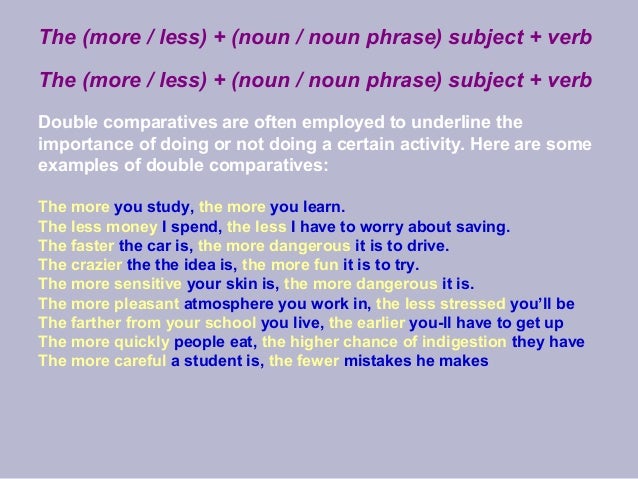double comparatives
Double Comparatives and Superlatives
Double Comparatives and Superlatives
- There are times in writing when a comparison is necessary. A description gives the reader specific details in order to provide them with an image. Making a comparison is another way of providing the reader with imagery within a descriptive narrative. The usage of both comparison and description helps in to keep the reader engaged with the text.
- Comparative sentences contain adjectives and adverbs that tend to end in –er, ‑est or have the words “more” and “most”. As a refresher, adjectives describe a noun or pronouns; while adverbs describe a verb, adjective or other adverb.
- In the comparative degree, modifiers usually take “-er” or “more” to show comparison. In contrast, adjectives and adverbs in the superlative degree are similar to the comparative degree, but use the -est ending and the word “most” instead. In addition, the article “the” must be placed before the adjective or adverb in the sentence.
- Some common mistakes with the construction of comparative sentences are not finishing the comparison, or trying to compare things that should not be compared. This may seem simple enough, but there are some exceptions and things to note.
Double Comparatives and Double Superlatives
- A double comparative is a sentence that compares two things. Forming adjectives and adverbs in the comparative degree can be a little tricky.
- Adjectives in the comparative degree end in -er, such as newer in the previous sentence “My car is newer than his car.”. Adverbs that end in -ly use “more” instead to form the comparative degree, as in more highly in the sentence “Mary speaks more highly of the iTouch than the iPod.”.
- The most common error with double comparatives is the usage of both the -er ending and the word “more”. These sentences generally sound awkward when read out loud. Consider the following sentence:
“Mary speaks more highlier of the iTouch than the iPod.”
- In this case it would be best to remove the -er and use the adverb in its comparative degree. Now, reconsider the sentence:
“Mary speaks more highly of the iTouch than the iPod.

Comentarios
Publicar un comentario